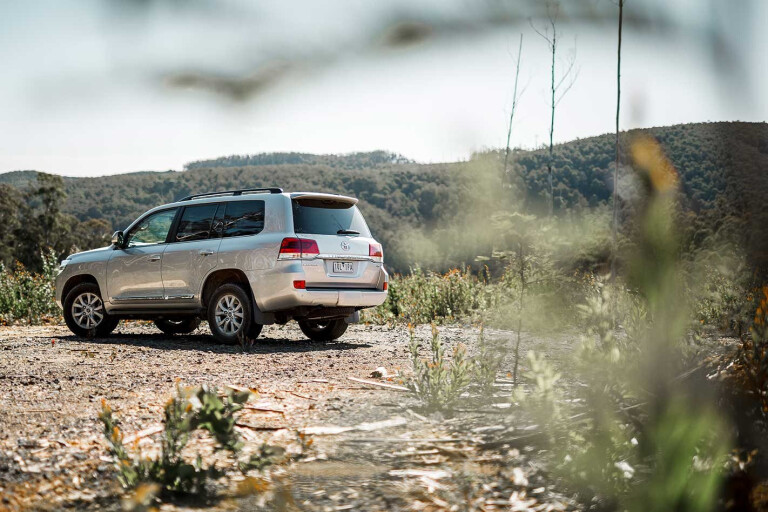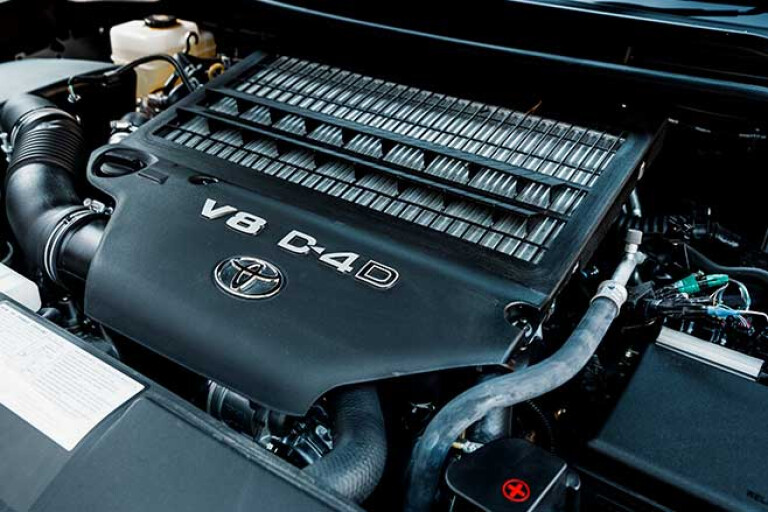
Speculation that Toyota’s 4.5-litre V8 diesel is on the chopping block is gaining more voice, and while the big oiler V8 won’t live forever I think its imminent demise is overstated.
The diesel V8 in question is currently used in the LandCruiser 200 (in twin-turbo form) and as a single-turbo engine in the various 70-Series models.
Its future seemingly hinges on the replacement for the 200 Series – let’s call it the 300, which has been “about to arrive” for a couple years now but hasn’t. Third-quarter 2021 is the latest debut date.
OPINION V8 diesel vital to LandCruiser's future
That the 300, and its Lexus equivalent, won’t have naturally aspirated petrol V8s is a given, V8s being on the nose environmentally.
Not that you can buy a petrol V8 in an Australian-delivered 200 now, but petrol V8s are currently the default engine globally for the 200 and its Lexus stablemate.
To replace the current 4.6- and 5.7-litre petrol V8s globally, downsizing to something smaller suggests two V6s, somewhere between 3.5 and 4.0 litres.
One will need forced aspiration (presumably turbocharging) to make up the capacity difference and to be used in the LX and top-spec 300s, while commercial-grade 300s will need a naturally aspirated engine that wouldn’t be so fuel-sensitive.

Both of these petrol V6s will most likely be teamed with electric motors in hybrid powertrains, given the electric-motor component in these hybrid powertrains can add off-idle torque, which also helps to offset the reduction in engine capacity.
So much for the 300’s petrol-engine global future; the more pertinent question for Australia is what about the diesel?
If the diesel V8 is to go … that is, not appear in the 300 when it arrives (presumably late 2021) … it’s hard to imagine Toyota not offering a diesel of some sort in the 300, given it has only recently dropped the 4.6-litre petrol V8 from the 200 due to an almost complete lack of buyer interest.
When the petrol V8 was available some 98 per cent of buyers still opted for the diesel V8.
Australia is, in fact, the biggest market for the 200 diesel when compared to other significant 200-Series markets. These include not only the Middle East but also South-East Asia, North America and Russia, who also prefer petrol.
And if the V8 diesel does go, where does that leave the 70 Series, given most 70s sold globally now have the diesel V8?
LC300 Prado power predicted
Toyota does have a modern diesel engine in its ‘cupboard’ in the form of the recently re-engineered 2.8-litre four (in Hilux and Prado), and while this engine may work in the 70 in some markets and perhaps here too for some buyers (it actually claims more torque than the 70-Series V8), it’s hardly going to cut the mustard in the 300.
At a time when the global future of the diesel engine is uncertain, is Toyota going to invest in a new-generation diesel for the 300, when the demand for such a thing outside Australia is limited? That’s the question.
One option for Toyota, and one that would save development and manufacturing costs, would be to simply build a six-cylinder off the 2.8, given the 2.8 currently represents the most up-to-the-minute diesel tech that Toyota has.
It’s certainly more modern than the V8, which first appeared in 2007.
A six-cylinder engine based on the cylinder architecture of the 2.8 four would end up at 4.2-litres, which is a very familiar capacity for a six-cylinder Toyota diesel.
And on extrapolation it could make 225kW and 750Nm, which is handy in anyone’s language.
And my guess is that if Toyota were to develop a six, an in-line six is more likely than a V6 due to reduced manufacturing costs, smoother running, and simpler turbocharging.
A low-power version of this six-cylinder diesel could be used in the 70, while the 300 gets a high-power version with a bigger turbo, or perhaps a bi-turbo arrangement.
Anyway, it’s all still speculation, which only comes into play if indeed the V8 diesel is consigned to history. Time will tell.

COMMENTS